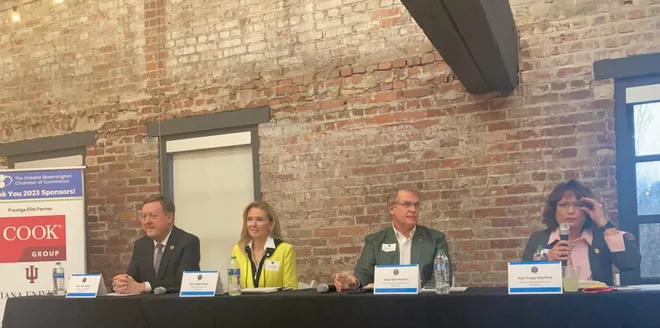|
NOTE: This article that features The Chamber's event, Legislative Preview, was published on January 17, 2024 in the Herald-Times by Laura Lane. Photos are provided by Herald-Times. At the helm of a city with an unhoused population mired in mental health and substance abuse issues, Kerry Thomson asked a panel of state lawmakers last week what they will do about the statewide crisis. “It cannot be addressed just at the local level,” the Bloomington mayor's written query stated. There was discussion of the challenges, but no answers offered when Thomson suggested the state lead the way toward healthcare and recovery instead of the criminal justice system for vulnerable people not receiving care. Last year, state lawmakers passed bills to boost funding for mental health services across the state. One increases funding to local mental health centers and another directs $100 million to mental health services. It’s about a third of the amount sought by the state’s behavioral health commission and comes with no framework on how to best spend the money, District 40 State Sen. Shelli Yoder said during a Bloomington Chamber of Commerce legislative update lunch on Friday.
“We don’t have the infrastructure,” the lone Democrat on the panel explained. “We have a bill and put some money there … not enough for the need,” Yoder said. “Indiana doesn’t have an infrastructure to respond to the great need every community is suffering when it comes to mental health.” State Sen. Eric Koch, a Republican representing District 44, said the bill is in its early stages, but he hopes it will make a difference. Both he and Republican State Rep. Peggy Mayfield, from District 60, said special courts that deal with people with mental health issues, such as the one in Monroe County, are part of the answer. District 46 Republican State Rep. Bob Heaton was blunt when echoing Yoder’s concern about funding. “It takes money,” he said. Mayfield said the funding that is available needs to be directed toward people with the most serious and acute mental illness. Other topics and legislative priorities were addressed. Koch is sponsoring a bill to establish a process for efficient and affordable testing and replacement of lead water service lines estimated to be in about 265,000 Indiana homes, most of them older and in rural areas. Yoder is focused on affordable and available childcare, which she says is among the three top concerns of her constituents: the other two are healthcare access and affordable housing. She said childcare legislation that passed the last session contains good ideas but provides no funding to raise childcare providers’ pay so there are enough workers to fill the state’s childcare void. “We have 600,000 parents struggling to find childcare today in the state,” Yoder said. “Childcare is the most expensive and stressful issue that impacts families.” Liberal Yoder and conservative Mayfield don’t have much in common politically, but Mayfield said she now has an interest in the childcare issue because her son’s wife is expecting a baby this summer. “I told my daughter-in-law to look for childcare now and October is the soonest she could find,” Mayfield said, at a cost of $400 a week. “There aren’t any spaces. It’s not just the cost.” Heaton emphasized the importance of listening to voters. And what he hears from his mostly rural and conservative constituents is “they would like for us to let them keep their money and let them spend it the way they want to spend it.”
0 Comments
Leave a Reply. |
Chamber NewsThis blog contains press releases, other news updates from the Chamber, news articles and radio interviews featuring interviews with the Chamber and team members, and much more! Categories
Categories
All
Archives
Archives
July 2024
|
|
Copyright The Greater Bloomington Chamber of Commerce. All Rights Reserved.



 RSS Feed
RSS Feed
